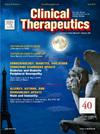Safety and Tolerability of Home Infusions in Down Syndrome Regression Disorder
IF 3.2
4区 医学
Q2 PHARMACOLOGY & PHARMACY
引用次数: 0
Abstract
Purpose
Down syndrome regression disorder (DSRD) is a rare neuropsychiatric condition affecting otherwise healthy individuals with Down syndrome. Multiple studies on DSRD have revealed that immunotherapy with intravenous immunoglobulin (IVIg) is both safe and effective, although site of infusion has never been studied. This study sought to evaluate the safety and tolerability of IVIg in individuals with DSRD receiving home-based infusions.
Methods
A single-center, retrospective chart review evaluating infusion reactions was performed for individuals meeting criteria for DSRD and having received IVIg infusions between 2019 and 2024. Adverse events (AEs) were evaluated for severity and need for alterations in infusion plan. A cohort of individuals receiving home-based infusions was compared with a cohort of individuals receiving infusions at an academic medical center.
Findings
A total of 315 individuals (162 institutional infusions [51%] and 153 home infusions [49%]) met the inclusion criteria. There were no statistical differences between the demographic and clinical features of the cohorts. Individuals receiving home infusions had the same rate of AE during an infusion (P = 0.14), although they did have a lower number of total AEs (P < 0.001). Individuals receiving home infusions experienced a lower number of behavioral issues with infusions (P = 0.03) and had significantly lower discontinuations of infusions secondary to behavioral issues (P = 0.04).
Implications
Rates of AEs and serious AEs in those with DSRD were the same regardless of site of infusion. These data should be considered in policy regarding the appropriateness of home-based infusions as a safe alternative, when suitable for patients and caregivers, for individuals with DSRD.
唐氏综合症退行性障碍家庭输液的安全性和耐受性。
目的:唐氏综合征退行性障碍(DSRD)是一种罕见的神经精神疾病,影响其他健康的唐氏综合征患者。多项研究表明,静脉注射免疫球蛋白(IVIg)免疫治疗是安全有效的,尽管从未研究过输注部位。本研究旨在评估接受家庭输液的dsd患者IVIg的安全性和耐受性。方法:对2019年至2024年期间接受IVIg输注的符合dsd标准的个体进行单中心回顾性图表回顾,评估输液反应。评估不良事件(ae)的严重程度和是否需要改变输注计划。一组接受家庭输液的个体与一组在学术医疗中心接受输液的个体进行了比较。结果:共有315人(机构输液162例[51%],家庭输液153例[49%])符合纳入标准。队列的人口学和临床特征之间没有统计学差异。接受家庭输液的个体在输液期间的AE发生率相同(P = 0.14),尽管他们的AE总数较低(P < 0.001)。接受家庭输液的个体在输液过程中出现的行为问题较少(P = 0.03),因行为问题而停止输液的人数也显著减少(P = 0.04)。含义:无论输注部位如何,DSRD患者的不良反应发生率和严重不良反应发生率是相同的。这些数据应该在政策中考虑到家庭输液是否适合作为一种安全的替代方案,当适合患者和护理人员时,对于患有dsd的个体。
本文章由计算机程序翻译,如有差异,请以英文原文为准。
求助全文
约1分钟内获得全文
求助全文
来源期刊

Clinical therapeutics
医学-药学
CiteScore
6.00
自引率
3.10%
发文量
154
审稿时长
9 weeks
期刊介绍:
Clinical Therapeutics provides peer-reviewed, rapid publication of recent developments in drug and other therapies as well as in diagnostics, pharmacoeconomics, health policy, treatment outcomes, and innovations in drug and biologics research. In addition Clinical Therapeutics features updates on specific topics collated by expert Topic Editors. Clinical Therapeutics is read by a large international audience of scientists and clinicians in a variety of research, academic, and clinical practice settings. Articles are indexed by all major biomedical abstracting databases.
 求助内容:
求助内容: 应助结果提醒方式:
应助结果提醒方式:


